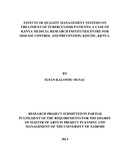| dc.description.abstract | Tuberculosis disease is a global burden ranked eighth highest cause of death and its treatment
would be efficient with the presence of Quality management systems in all sectors of
Tuberculosis management. It was thus considered important to investigate the effects of
Quality management systems on treatment of Tuberculosis. Until 2011, KEMRI/CDC
Tuberculosis branch conducted research without clearly outlined quality management
systems. The absence of Quality management systems may lead to many challenges like
release of delayed results due to inefficient quality systems in diagnosis sector. This may lead
to patients going without treatment due to lack of clear diagnosis, unnecessary deaths and
continuous infection in the community. The Quality management systems were implemented
in the Tuberculosis branch since 2011. The purpose of the study was to investigate the effect
of Quality management systems looking at turnaround time, results accuracy, drug inventory,
monitoring and evaluation through DOTS and data management on Tuberculosis patient
treatment in KEMRI/CDC. Among the objectives that this study investigated included; extent
to which Turnaround time, result accuracy, drug inventory, monitoring and evaluation and
data management influenced Tuberculosis patient treatment with the research question
addressing the level at which they influenced TB treatment. The target population was 200
KEMRI/CDC staff dealing with Tuberculosis patients. The research employed a descriptive
cross sectional survey and 133 staff were interviewed. Data was collected using
questionnaires administered to the staff dealing with Tuberculosis patients. Pilot-testing was
used in making the instrument valid using 13 staff from Jaramogi Oginga Odinga Teaching
and Referral Hospital. Data was entered into the computer and analyzed using computer
supported software. All questionnaire parameters were entered into the Statistical Package for
Social Scientists (SPSS) for results presentation and univariate and bivariate statistics
analyzed study data. Study found out time to diagnosis did not affect TB treatment with
majority 35(26.3%) taking 3weeks -1 month and completing medication in 6 months.
81(60.9%) of the respondents received smear results in 48 hours, 61(45.9%) received correct
results, 76(57.1 %) results were complete, 75(56.4%) had routine drug inventory, 72(54.2%)
had no expiries in the TB clinics, 85(63.9%) of patients are under follow up, 87(65.5%) are on
DOT, 76(57.1 %) of the respondents used both electronic and paper or purely electronic and
87(65.4%) were linking patients to the TB registers with all these categories completing TB
treatment in a record time of 6 months. The study concluded that a quality management
system in KEMRI/CDC TB section had improved treatment of TB patients. The study
recommends that other sectors dealing with TB patients especially the public hospital where
the TB burden lies, should implement quality management systems to enhance effective TB
treatment. | en_US |

